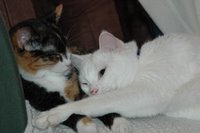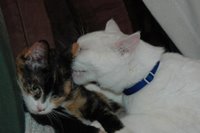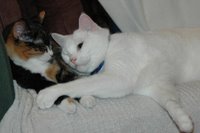Throughout my career, I have worked with a number clients who testing (called a video swallow study) determined weren't safe to eat and/or drink food. Usually, we then recommend to the parents that they talk to the doctor about having the child set up with non-oral feeds (tube feeding). Sometimes the families agree, sometimes they insist on continuing with oral feeding even if tests show it isn't safe. It is generally accepted that the parents have the ultimate decision. As a speech therapist, it is then my job to work with the dietitian to see how the client can be the safest possible and be as close as possible to meeting nutritional needs. However, sometimes there is no type of food or drink that is thought to be safe. In previous jobs, we have then required parents to come in and feed the children while at school because the school staff would not take on that risk (these are extreme cases).
Now, people often wonder two things about the decision making process for non-oral feeding. One, why would a parent protest non-oral feeding methods if oral intake isn't safe or enough to meet nutritional needs? The answer is that feeding/eating is often the one "typical" thing that a child can do. If a child can't eat/drink, then they are perceived as even more disabled. There are a lot of emotions around that. On some level, I think it also means that the child is/could be sick and could die. That is scary. Additionally, eating is a very social occasion. People who don't eat orally miss out on a lot of social opportunities. Finally, it is often seen as a quality of life issue. People frequently enjoy eating and caregivers think that we are "taking that away" from the client if the doctors put in a tube for feeding (usually a surgical procedure into the stomach).
The second thing people often wonder is why parents are given the control over the issue, especially if the child has recurrent pneumonia caused by aspiration (food/drink entering the lungs) or is malnourished. If a child is malnourished or not safe to eat and the parents are refusing treatment, is this then medical neglect? That one I don't really know the answer to. I can see that side of the argument but at the same time I see the family's struggle with the acceptance of the level of difficulty the child is having.
Also, for some children, this is how the child always was so it is perceived that the professionals are creating the problem. It is really a difficult balancing act between trying to do what is best for the child and helping the parents decide what really is best. Just because a feeding tube can be inserted and extend the quantity of someone's life doesn't mean that it always should be. Their quality of life may decrease (especially if they are sick or really enjoyed eating). The child may be medically fragile and a surgical placement of a tube may be too risky.
Friday, November 24, 2006
Sunday, November 19, 2006
So adorable!
Since I have been crazy busy lately, I haven't been able to post pictures that I took about three weeks ago of the kitties. I need to focus on the Christmas show that I am organizing and the Christmas party...
Anyway, as I started saying, the cats get along really well. The pictures prove it. Aren't they so adorable?







Anyway, as I started saying, the cats get along really well. The pictures prove it. Aren't they so adorable?







Thursday, November 16, 2006
Adventures in Problem Solving
Part of speech/language therapy can be working on problem solving skills. When working in the area of intellectual disability, the students/clients often need real life examples to teach the skill instead of verbal/picture examples. Here is one of my favorite therapy "mishaps."
The activity was making smoothies. The student read the ingredient page (we are also working on reading comprehension) and then needed multiple prompts to go get the stuff off the table. Finally, we get all the ingredients in the hand blender container. We then get to the "blend the smoothie" direction. The student took the hand blender and plugged it in. She then tried to stretch the cord to reach the table. Doesn't work. She tried again. Doesn't work. I ask her if the lead/cord reaches. She says "yes." So I let her try again. Still doesn't reach.
Since she wasn't understanding that the lead couldn't be longer than it was, I said that I would bring the container with the ingedients over to her. However, she pulled on the plug. The plug didn't come out. She pulled more. And more. The plug came out. However, part of it stayed in the wall socket! Yep, the hand blender broke.
So, it took about 10 minutes to get her to understand that the blender was broken and we couldn't blend the smoothie. I ended up having her put it in the bin to help her understand because she kept trying to plug it in. Since we still wanted a smoothie, I got the idea that we could use the bottom part of the hand blender to mash the fruit (it had a blade). I showed my student how to do this. She asked for a turn. She lifted the part of the blender we were using and plunged it down into the container. Liquid splashed everyhwere! On the floor, on the counter, on my student, everywhere. After prompting, she cleaned up the floor. Then we tried to mix more.
About an hour after we started, we were drinking and cleaning up half mashed "smoothie." Yet, somehow, I stayed clean, which was good since I had an important meeting right after the session!
The activity was making smoothies. The student read the ingredient page (we are also working on reading comprehension) and then needed multiple prompts to go get the stuff off the table. Finally, we get all the ingredients in the hand blender container. We then get to the "blend the smoothie" direction. The student took the hand blender and plugged it in. She then tried to stretch the cord to reach the table. Doesn't work. She tried again. Doesn't work. I ask her if the lead/cord reaches. She says "yes." So I let her try again. Still doesn't reach.
Since she wasn't understanding that the lead couldn't be longer than it was, I said that I would bring the container with the ingedients over to her. However, she pulled on the plug. The plug didn't come out. She pulled more. And more. The plug came out. However, part of it stayed in the wall socket! Yep, the hand blender broke.
So, it took about 10 minutes to get her to understand that the blender was broken and we couldn't blend the smoothie. I ended up having her put it in the bin to help her understand because she kept trying to plug it in. Since we still wanted a smoothie, I got the idea that we could use the bottom part of the hand blender to mash the fruit (it had a blade). I showed my student how to do this. She asked for a turn. She lifted the part of the blender we were using and plunged it down into the container. Liquid splashed everyhwere! On the floor, on the counter, on my student, everywhere. After prompting, she cleaned up the floor. Then we tried to mix more.
About an hour after we started, we were drinking and cleaning up half mashed "smoothie." Yet, somehow, I stayed clean, which was good since I had an important meeting right after the session!
Monday, November 06, 2006
Euthanasia for infants?
According to this BBC "health" article, the Royal College of Obstetricians and Gynaecologists in the UK are apparently requesting that the Nuffield Council on Bioethics consider "more radically about non-resuscitation, withdrawal of treatment decisions... and active euthanasia, as they are ways of widening the management options available to the sickest of newborns." The Nuffield Council on Bioethics is an independent body that examines the ethics of the advances in biology and medicine.
I only know what the BBC article says, which isn't much, about the Royal College's request. However, it still raises some serious ethical issues for me. First, how would they define seriously ill children/infants? The article cites the increase of premature babies surviving and having significant disabilities as part of the reason for the request from the Royal College. However, no one can predict accurately which premature infants will have profound disabilities and which will end up being healthy children. Granted, trauma at birth such as a hemorraghe indicates a high probability of future disability but not always. Still, many people have had poor health or major health problems at some point in infancy or early life. Does that mean that we should euthanize them? I would say no.
So, no one can predict at birth who will survive and lead a healthy life and who won't. That goes for infants not born prematurely, also. A seemingly healthy infant can have seizures later. A child can have a head injury. An otherwise healthy baby could die from SIDS.
The other part of this issue is the stress on the family that having a member with a profound disability can cause. Having children is stressful. Having a child with a disability is even more stressful. However, that does not mean that the families or children have a reduced quality of life? A child with a disability can have a good quality of life. We may not judge their quality of life as high or good by our standards, but if the people are happy, isn't that good quality of life? I know, happiness is only one quality of life indicator. But how do we really judge someone else's quality of life?
Further, how do we judge the worth of someone else's life, at any age? And isn't that really what the Royal College is asking the Nuffield Council to do?
I only know what the BBC article says, which isn't much, about the Royal College's request. However, it still raises some serious ethical issues for me. First, how would they define seriously ill children/infants? The article cites the increase of premature babies surviving and having significant disabilities as part of the reason for the request from the Royal College. However, no one can predict accurately which premature infants will have profound disabilities and which will end up being healthy children. Granted, trauma at birth such as a hemorraghe indicates a high probability of future disability but not always. Still, many people have had poor health or major health problems at some point in infancy or early life. Does that mean that we should euthanize them? I would say no.
So, no one can predict at birth who will survive and lead a healthy life and who won't. That goes for infants not born prematurely, also. A seemingly healthy infant can have seizures later. A child can have a head injury. An otherwise healthy baby could die from SIDS.
The other part of this issue is the stress on the family that having a member with a profound disability can cause. Having children is stressful. Having a child with a disability is even more stressful. However, that does not mean that the families or children have a reduced quality of life? A child with a disability can have a good quality of life. We may not judge their quality of life as high or good by our standards, but if the people are happy, isn't that good quality of life? I know, happiness is only one quality of life indicator. But how do we really judge someone else's quality of life?
Further, how do we judge the worth of someone else's life, at any age? And isn't that really what the Royal College is asking the Nuffield Council to do?
Sunday, November 05, 2006
Girls night out
After lunch one day, I had coffee with a couple of the girls and then went on my way. At 5:00, I got a phone call that quite a few of my mates were at the Porterhouse Central. When I met up with them, I found out that they had been there since 2:00 PM and were quite happy!
I ordered my hot whiskey to help my sore throat and the others kept drinking. And drinking. They tended to drink 2 for my one! About 10:00 PM, the music started and we started dancing. And some mates kept drinking.
About 12:00, I noticed that that staff were looking at us a bit differently, as were some of the other patrons. I stopped drinking and switched to water. After a while, one of the guys that was with us asked what we wanted for the next round. I said that I was cut off and that one of my friends was as well because she was quite drunk (pissed). However, he said that I couldn't cut someone else off. He then turned to a third friend and asked what she wanted. She said that she was cut off and so was the girl I said was cut off. He still didn't seem to like that but I think he allowed it. I guess it isn't socially appropriate to cut people off here. I was just trying to look out for my friend.
I ordered my hot whiskey to help my sore throat and the others kept drinking. And drinking. They tended to drink 2 for my one! About 10:00 PM, the music started and we started dancing. And some mates kept drinking.
About 12:00, I noticed that that staff were looking at us a bit differently, as were some of the other patrons. I stopped drinking and switched to water. After a while, one of the guys that was with us asked what we wanted for the next round. I said that I was cut off and that one of my friends was as well because she was quite drunk (pissed). However, he said that I couldn't cut someone else off. He then turned to a third friend and asked what she wanted. She said that she was cut off and so was the girl I said was cut off. He still didn't seem to like that but I think he allowed it. I guess it isn't socially appropriate to cut people off here. I was just trying to look out for my friend.
Subscribe to:
Comments (Atom)
